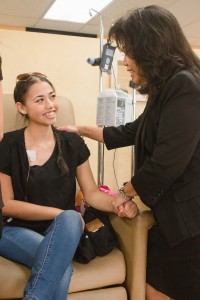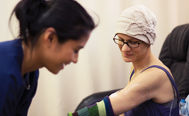 Ever since HPV (human papillomavirus) was identified as a primary risk factor for cervical cancer, there has been a decrease in cases of this once deadly disease. In having identified the virus’ role in cervical cancer, researchers have been instrumental in developing diagnostics and treatment for the virus. In fact, cervical cancer is now considered one of the most preventable varieties of the disease.
Ever since HPV (human papillomavirus) was identified as a primary risk factor for cervical cancer, there has been a decrease in cases of this once deadly disease. In having identified the virus’ role in cervical cancer, researchers have been instrumental in developing diagnostics and treatment for the virus. In fact, cervical cancer is now considered one of the most preventable varieties of the disease.
However, defeating cervical cancer takes preventive action and sometimes we need a little encouragement to take advantage of preventive measures available to us. The physicians at the Cancer Center of Southern California believe that educating patients and the general public is an important first step in cancer prevention. In learning more about cancer behavior and risk factors, we can make informed decisions about our health.
What Is Cervical Cancer?
Almost six million American women annually contract HPV, a sexually transmitted virus which can lead to cervical cancer. For many women, the undetected virus gets cleared away by their body’s natural immune system. However, for some, the virus remains in the cervix to develop infected cells which could lead to cancer.
The cervix is located in the lower section of the uterus leading into the vagina, and cancer, as a result of the HPV virus, can develop at either end of the cervix. This is not a fast-growing disease; instead, cervical tissue first goes through a lengthy pre-cancerous stage before evolving into cancer. Since the process is slow, it increases the chances of early detection, which makes it highly preventable, but only if preventive screenings (i.e. Pap test) and clinical exams are regularly performed.
Avoid Risk Factors
Risk factors are the conditions which could increase the chance of your getting a disease, in this case, cervical cancer. If any of these risks are present, it doesn’t mean you will definitely get the disease, only the possibility of getting it is affected.
Known risk factors include:
- HIV positive
- Chlamydia infection
- Multiple pregnancies
- Oral contraceptive use
- History of cervical cancer
- Dietary insufficiency
- Overweight
- Smoking
It is important though, that if you have any of these risks factors, you should at least take precautions against developing cervical cancer by having regular Pap tests and getting HPV screening. Girls and young women from 9 to 26 must get the HPV vaccination, which has proven to be highly effective in destroying the virus.
If You Have Symptoms
Cervical cancer typically does not have any early indicators of the disease. Not until the cancer has reached a more advanced stage will symptoms appear and possibly include:
- Fatigue
- Back or pelvic pain
- Difficulty urinating
- Constipation
- Irregular bleeding
- Swollen legs
- Weight loss
If you suspect that you might have cervical cancer or a serious medical condition, you need to consult a specialist. The Cancer Center of Southern California recommends patients scheduling an appointment with a cancer specialist to check their health. If you have the disease, find out about your treatment options and get a second opinion. Dr. Santa Chawla, the Cancer Center director, is often sought out by patients for his recommendations. Dr. Chawla is a noted authority on cancer treatment and one of the most well-known oncologists internationally.
Learn More from Cancer Specialists
If you suspect cervical cancer or would like to learn more about prevention and detection, contact the Cancer Center of Southern California. The center’s doctors, such as Dr. K. “Kumar” Shankhala, are internationally known for their expertise in cancer diagnosis and treatment. Call us today at (310) 879-1099 to schedule a consultation.
Next, read Nutrition Tips for Dealing with the Side Effects of Cancer Treatment



